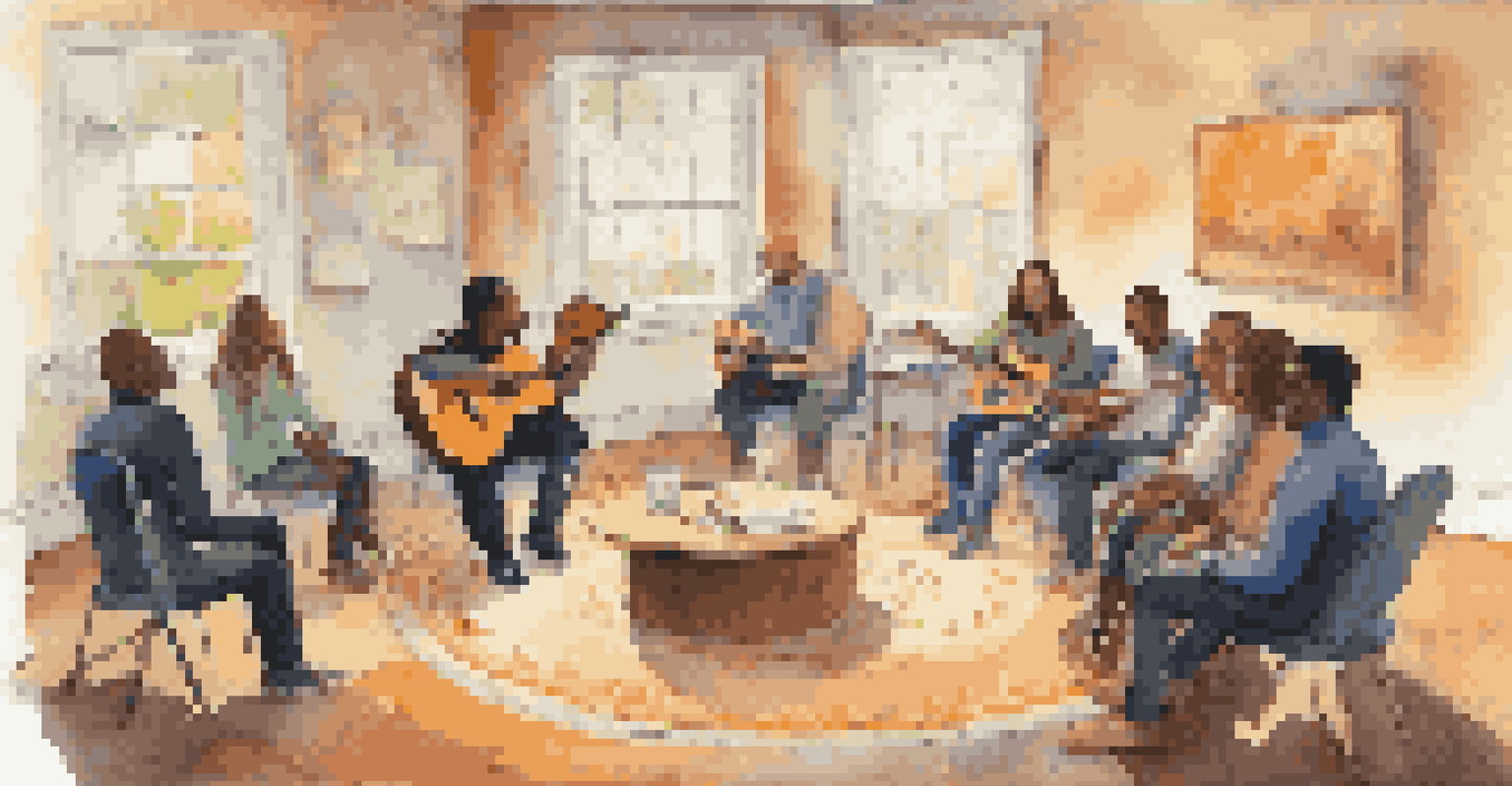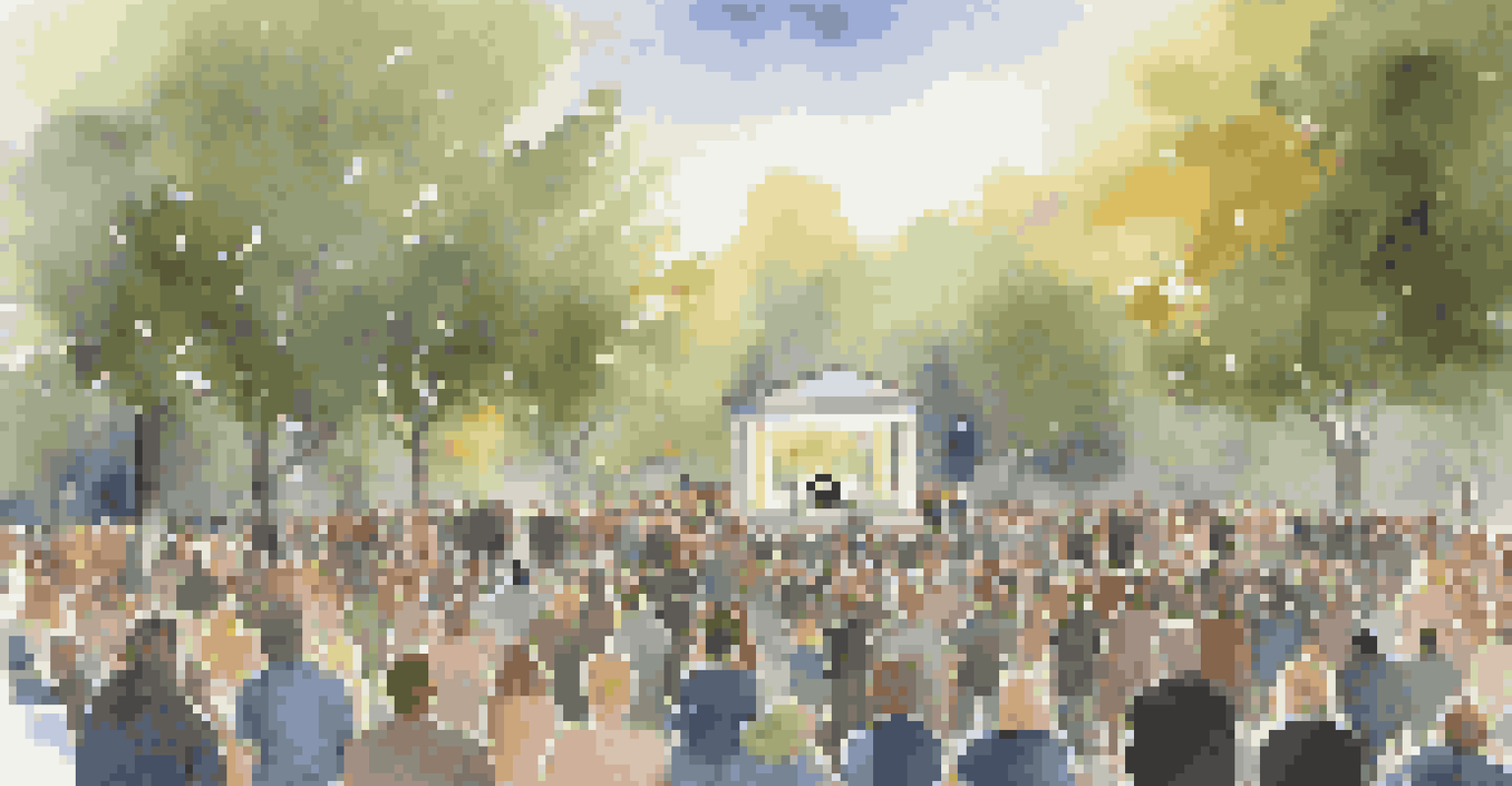Exploring the Role of Music in Grief and Loss Therapy

Understanding Grief: A Natural Response to Loss
Grief is a universal experience that everyone encounters at some point in their lives. It's a natural response to loss, whether it's the death of a loved one, the end of a relationship, or any significant life change. This emotional journey can be overwhelming, often leaving individuals feeling isolated and unsure about how to cope.
Music can change the world because it can change people.
The process of grieving can manifest in various ways, including sadness, anger, or even confusion. It’s important to recognize that everyone experiences grief differently, and there’s no right or wrong way to feel. Understanding this allows individuals to embrace their emotions rather than suppress them, paving the way for healing.
In this context, therapy can play a vital role in helping individuals navigate their grief. One innovative approach that has gained traction is the incorporation of music into therapeutic settings, offering a unique way to express and process complex emotions.
The Therapeutic Benefits of Music
Music has a remarkable ability to evoke emotions and memories, making it a powerful tool in therapy. Studies show that listening to or creating music can reduce stress and anxiety, which are common companions of grief. This emotional release can provide a sense of relief, allowing individuals to feel understood and less alone in their journey.

Moreover, music can serve as a bridge between the past and present, helping individuals connect with cherished memories of lost loved ones. By listening to songs that remind them of happy times, clients can honor their memories while also processing their grief. This dual experience can facilitate healing, as they navigate the complexities of loss.
Grief is a Unique Journey
Everyone experiences grief differently, and understanding this can help individuals embrace their emotions and begin the healing process.
Additionally, music therapy encourages self-expression, allowing individuals to share their feelings in a non-verbal way. For those who find it difficult to articulate their pain or sorrow, music offers an alternative mode of communication, fostering a deeper understanding of their emotions.
How Music Therapy Works in Grief Counseling
Music therapy in grief counseling typically involves a trained therapist who guides clients through various musical activities. These activities may include listening to music, writing songs, or even improvising with instruments. The goal is to create a safe space where clients can explore their feelings related to grief and loss.
Grief is not a sign of weakness, nor a lack of faith... It is the price of love.
During sessions, clients might discuss the significance of certain songs or share their emotional responses to music. This dialogue can reveal underlying feelings and thoughts that may not have surfaced otherwise. By addressing these emotions, clients can begin to process their grief more effectively.
Moreover, music therapy can be tailored to meet the unique needs of each individual. Whether through soothing melodies to promote relaxation or upbeat tunes to inspire hope, therapists can customize the experience to resonate with each client's emotional state. This personalized approach enhances the therapeutic process, fostering a deeper connection with the music and, ultimately, with their grief.
Creating a Music Playlist for Grief Support
One of the simplest yet most impactful ways to incorporate music into grief therapy is by creating a personalized playlist. This playlist can include songs that evoke happy memories, comfort, or even express sadness. By curating these tracks, individuals can have a go-to resource that resonates with their emotions during difficult times.
When selecting songs, it's crucial to consider the emotional responses they evoke. For instance, a song that brings back joyful memories may provide solace, while another that reflects sorrow can help release pent-up feelings. This intentional selection process can empower individuals to connect with their grief in a meaningful way.
Music Aids Grief Healing
Music therapy offers a powerful way to express and process complex emotions, facilitating healing through self-expression and connection to memories.
Listening to this playlist can become a ritual, a time to reflect on memories and emotions. Whether during quiet moments alone or shared with friends and family, music can transform a space of sorrow into one of remembrance and healing, fostering connections with both the past and the present.
The Role of Live Music in Grief Therapy
Live music can play an extraordinary role in grief therapy, offering a communal experience that recorded music cannot replicate. Whether through group sessions or intimate gatherings, live performances can create a profound atmosphere that encourages emotional expression and connection among participants. The shared experience of live music can foster a sense of togetherness, reminding individuals they are not alone in their grief.
In some therapeutic settings, musicians collaborate with therapists to create tailored performances that resonate with clients' experiences. These sessions may involve songs that reflect the themes of loss, healing, and hope, providing a powerful backdrop for emotional exploration. The energy of live music can invigorate the emotional landscape, facilitating a deeper connection to the therapeutic process.
Furthermore, live music can also be a form of tribute to loved ones who have passed. Many people find comfort in attending memorial services or community events featuring music that honors the deceased. This collective remembrance through music allows individuals to celebrate life while acknowledging their grief.
Music as a Tool for Self-Reflection and Growth
Engaging with music during the grieving process can lead to profound self-reflection and personal growth. As individuals listen to lyrics or melodies that resonate with their feelings, they may find new insights into their emotions and experiences. This self-exploration can be a vital component of healing, helping individuals understand their grief on a deeper level.
Moreover, music can inspire creativity, encouraging individuals to express their thoughts and feelings through songwriting or musical improvisation. This form of artistic expression not only aids in processing grief but also fosters resilience, allowing individuals to emerge stronger from their experiences. Engaging with music in this way can help them reclaim their identity after loss.
Community Supports Grief Recovery
Engaging with music in community settings fosters connections and shared understanding, providing solace and support for individuals navigating their grief.
Ultimately, the journey of grief is not linear; it involves ups and downs. However, music can serve as a steady companion along this path, providing comfort, joy, and hope during challenging times. By embracing music as a tool for self-reflection, individuals can find meaning in their grief and pave the way for future growth.
Finding Support Through Music in Community Settings
Community support plays a significant role in the healing process, and music can be a powerful unifier in these settings. Many support groups now incorporate music therapy sessions, allowing individuals to share their experiences in a supportive environment. This communal aspect fosters connections, reminding participants that they are not alone in their grief journey.
In addition to group therapy, community events centered around music can also provide solace. Concerts, memorial services, or local gatherings where music is celebrated can create a sense of belonging and shared understanding. These events allow individuals to honor their loved ones while connecting with others facing similar challenges.

Furthermore, engaging in community music initiatives can spark creativity and promote healing. Whether through participating in a choir or attending music workshops, individuals can find joy and purpose amid their grief. By actively engaging with music in a community setting, they can build meaningful relationships and embrace the healing power of collective expression.